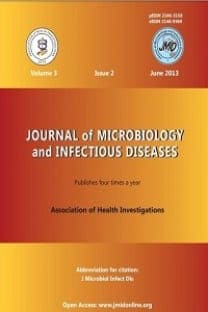Staphylococcus lugdunensis Endocarditis in a Patient Being Treated for Pyelonephritis
Staphylococcus lugdunensis
Endocarditis in a Patient Being Treated for Pyelonephritis
Christopher
M Peake1, Nicholas Faure-Walker2, Elli DeMertzi2
1St George’s University Hospital,
Blackshaw Road, Tooting, London, UK
2Kingston Hospital, Galsworthy Road,
Kingston-upon-Thames, UK
ABSTRACT
A 35
years old female with known chronic left pelvo-ureteric junction (PUJ)
obstruction presented with recurrent pyrexia and left loin pain and was treated
for pyelonephritis. She had a history of severe aortic valve (AV)
regurgitation. After five days of broad spectrum antibiotics and a percutaneous
nephrostomy, her fevers persisted. Staphylococcus
lugdunensis was isolated from her blood culture and she was diagnosed with
mitral valve endocarditis following an echocardiogram. She was transferred to a
tertiary cardiothoracic unit where she underwent a mitral and aortic mechanical
valve repair. After 6 weeks of intravenous antibiotic treatment she was
discharged without signs of infection but with poor cardiac function. S. lugdunensis is a virulent organism
which is thought to be underdiagnosed and is associated with aggressive and
destructive endocarditis. An awareness of the organism as well as prompt
diagnosis and treatment with effective multi-disciplinary management is needed
to avoid substantial morbidity in these patients.
Whilst
S. lugdunensis is known to cause
invasive endocarditis, it has never been reported following pyelonephritis. The
significance of this case is that despite receiving appropriate and timely
treatment the patient was left with deteriorating cardiac function. This is an
important reminder that this organism must be taken seriously when isolated in
the context of infection. J Microbiol
Infect Dis 2018; 8(1):37-40
Keywords: Staphylococcus lugdunensis, endocarditis,
pyelonephritis, heart valves, urinary tract
___
- REFERENCES 1.Beiber L, Kahlmeter G. Staphylococcus lugdunensis in several niches in the normal skin flora. Clin Microbiol Infect 2010; 16(4): 385-388. 2.Babu E, Orpello J. Staphylococcus lugdunensis: the coagulase negative staphylococcus you don’t want to ignore. Expert Review of Anti-Infective Therapy 2011; 9(10): 901-907. 3.Bhanot N, Sahud AG, Bhat S, et al. Fever of unknown origin: a case of cardiac myxoma infected with Staphylococcus lugdunensis. South Med J 2010; 103(7): 697-700. 4.Anguera I, Del Río A, Miró JM, et al. Staphylococcus lugdunensis infective endocarditis: description of 10 cases and analysis of native valve, prosthetic valve, and pacemaker lead endocarditis clinical profiles. Heart 2005; 91(2): e10. 5.Fervenza FC, Contreras GE, Garratt KN, et al. Staphylococcus lugdunesis endocarditis: a complication of vasectomy? Mayo Clinic Proc 1999; 74(12): 1227-1230. 6.Schandiz H, Olav Hermansen N, Jørgensen T, et al. Staphylococcus lugdunensis endocarditis following vasectomy - a report of a case history and review of literature. APMIS 2015; 123: 726-729. 7.Patel R, Piper KE, Rouse MS, et al. Frequency of isolation of Staphylococcus lugdunensis among staphylococcus isolates causing endocarditis: a 20-year experience. J Clin Micorbiol 2000; 38(11): 4262-426. 8.Durack DT, Lukes AS, Bright DK. New criteria for diagnosis of infective endocarditis: utilization of specific echocardiographic findings. Am J Med 1994; 96(3): 200-9 9.Li JS, Sexton DJ, Mick N, Nettling R, et al. Proposed modification to the Duke criteria for diagnosis of infective endocarditis. Clin Infect Dis 2000; 30(4): 633-8 10.Giese B, Glowinski F, Paprotka K, et al. Expression of δ–toxin by Staphylococcus aureus mediated escape from phago-endosomes of human epithelial and endothelial cells in the presence of β–toxin. Cell Microbiol 2011; 13(2): 316-329. 11.Bera A, Biswas R, Herbert S, et al. The presence of peptidoglycan O-acetyltranferase in various staphylococcal species correlates with lysozyme resistance and pathogenicity. Infect Immun 2006; 74(8): 4598-4604. 12.Pareja J, Gupta K, Koziel H. The toxic shock syndrome and Staphylococcus lugdunensis bacteremia. Ann Intern Med 1998; 128(7): 603-604. 13.Von Eiff C, Peters G, Heilmann C. Pathogenesis of infections due to coagulase-negative staphylococci. Lancet Infect Dis 2002; 2(11): 677-685. 14. Liu P, Huang Y, Tang C. Staphylococcus lugdunensis Infective Endocarditis: A literature review and analysis of risk factors. J Micro, Immun Infection 2010; 43(6): 478-84. 15.Paulsson M, Petersson AC, Ljungh A. Serum and tissue protein binding and cell surface properties of Staphylococcus lugdunensis. J Med Microbiol 1993; 38(2): 96-102. 16.Arciola CR, Campoccia D, An YH, et al. Prevalence and antibiotic resistance of 15 minor staphylococcal species colonizing orthopaedic implants. Int J Artif Organs 2006; 29(4): 395-401. 17.Grant CE, Sewell DL, Pfaller M, et al. Evaluation of two commercial systems for identification of coagulase-negative staphylococci to species level. Diagn Microbiol Infect Dis 1994; 18(1): 1-5. 18.Kloos WE, George CD. Identification of Staphylococcus species and subspecies with the MicroScan Pos ID and Rapid Pos ID panel systems. J Clin Microbiol 1991; 29(4): 738-744. 19.Haile DT, Hughes J, Vetter E, et al. Frequency of isolation of Staphylococcus lugdunensis in conservative urine cultures and relationship to urinary tract infection. J Clin Microbiol 2002; 40(2): 654-656.
- ISSN: 2146-3158
- Başlangıç: 2011
- Yayıncı: Sağlık Araştırmaları Derneği
Sayıdaki Diğer Makaleler
Yahya ISLAMOGLU, Cansu TOKAT, Sumeyra UYSAL
Marin M. MARİNOV, Todorka T. DİMİTROVA, Bojidarka G. KAYKAROVA, Tania İ. PERCHEMLİEVA, Rayna P. GARDEVA, Kartall COMANLİ, Vesela D. GEORGİEVA, Blagovesta R. GENEVA, Suheil YURUK
Christopher M PEAKE, Nicholas FAURE-WALKER, Elli DEMERTZİ
Anil JHA, Hassan GHOZ, Nicholas JAMES
Ajaz KOUL, Aadil RAFEEQ, İmtiyaz WANİ, M. Salim WANİ, Basharat KASANA, Arif HAMİD
Sumanpreet KAUR, Veenu GUPTA, Deepinder Kaur CHHİNA, Akashdeep SİNGH, Daaman SHARMA
Dara Agusti Maulidya, Muhammad Ibnu Kahtan, Diana Natalia, Mitra Handini, Ari Vidiyantoro
